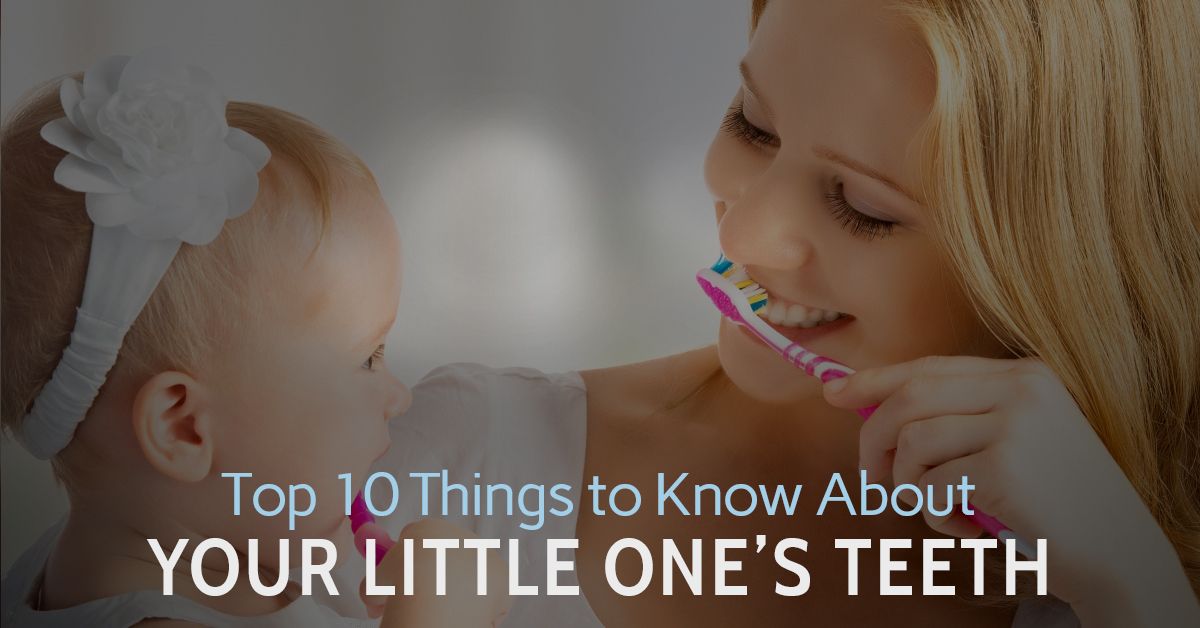Your little one may or may not have their teeth yet, but there are some things you need to know in order to keep your kid’s mouth healthy and strong. Here are the top ten things to know about your little one’s teeth and oral hygiene! After you finish learning about these great tips to protect your child’s health, contact Kruckman Family Dentistry to set up your appointment.
- Did you know that your baby is born with 20 teeth below the gums? They will usually begin to erupt in between the ages of six months and a year. Most kids will have all of their teeth in fully by the time they reach age three.
- Teething is an exciting time for both the baby and the parents! Know that as the teeth begin to grow in, your baby may become fussy, irritable, and sleepless. Some may even lose their appetite and drool quite a bit more than normal. Keep in mind, though, that fever, diarrhea, and rashes are not caused by teething. Your baby should be taken to the doctor if they are showing any of these symptoms.
- Believe it or not, decay can begin to a baby’s teeth as soon as they first appear. That means that as soon as you see these little teeth begin peeking out in your baby’s smile, it’s time to choose a fluoride toothpaste to keep them protected. Do your research and select a brand that has the ADA Seal of Acceptance.
- It takes very little toothpaste to get the job done well when cleaning your baby’s teeth. Until you know for a fact that your child knows how to brush their teeth on their own, you will need to brush their teeth twice a day with a brush designed for children. If your child is under the age of three, just use a smear of toothpaste. The size of a grain of rice is plenty! If your child is over three, you can use a pea-sized amount of fluoride toothpaste.
- The first visit to the dentist should happen after their first tooth appears, but you should not wait until after their first birthday. We recommend this because babies can get cavities as soon as their teeth begin coming in.
- You can floss your child’s teeth either before or after they brush, just as long as you are sure to floss in between any teeth that touch. Some parents find it easier to find child-friendly plastic tools to reach the teeth in the back, so consider this option if you are having a hard time!
- Baby bottle tooth decay is a real condition, so you should do what you can to prevent this. It most often occurs in the upper front teeth, and it is caused by prolonged exposure to drinks that contain sugar. This happens most when babies are put to bed with a bottle or the bottle is used as a pacifier for a crying baby.
- It can be tempting to use your spoon at dinner to also feed your baby a bite of your food, but many cavity-causing bacterias are passed through saliva. You might actually be introducing germs when you do this! Instead, use their spoon to scoop the food and feed them.
- When your child is thirsty, offer them water. Water, especially with fluoride, has been shown to reduce cavities by up to 25 percent. While you may want to feed your child juice and sports drinks, these can still cause cavities. Sugary drinks can also lead to obesity and other health problems, so limit your child’s access to keep them healthy.
- Considering sealants is a wonderful option, as they create an extra barrier between cavity-causing bacteria and your little one’s teeth. School-age children with sealants usually have about three times fewer cavities than those without.
Contact Kruckman Family Dentistry
We care about our Waconia families and want to do everything in our power to keep both children and adults alike happy and healthy. That’s why we offer top-of-the-line dental services. To learn more about what we offer, as well as to make an appointment for you and your child, give us a call! We look forward to seeing you and your bright smile!

